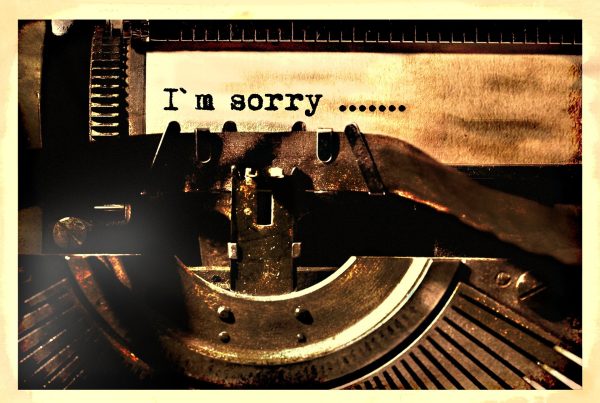I’m sorry…
Apologies are hard. It means admitting you were wrong and you hurt someone else because of it. Pride tells us not to admit our mistakes. God tells us pride comes before the fall. The best thing you can do to improve all of your relationships is to learn how to apologize.
In this article I will give you an outline for a great apology, discuss how to apologize even if you don’t feel like you did anything wrong and what to do if your apology is not accepted.
Every apology should follow the same basic outline. It makes it easier to remember it you’re like me and need to do it often. It is also easy to teach others. I taught my children to use this same outline when apologizing. Hopefully their future spouses will thank me for that.
The basic outline for a great apology is:
I’m sorry for________. It was not my intention to _______. I will ______in the future.
Some examples of this would be:
I’m sorry I stayed out late last night and didn’t call you. It was not my intention to hurt you or make you worry. I will make sure I call you in the future if I’m going to be late.
I’m sorry I bounced a check and it cost us more money. It was not my intention to hurt you or our finances. I will be more careful in the future and pay closer attention to our balance.
I’m sorry I made a joke about your job last night. It was not my intention to hurt you. I will try to think before I speak next time.
Notice the outline does not include the word “but” anywhere in it. This is the biggest mistake people make when apologizing. Do not defend your actions with the word “but”. It negates your apology. This is probably the hardest thing to learn and practice. It is in our nature to explain why we did something and defend ourselves. Most of the time people don’t care why you did something, only that you acknowledge it hurt them and you will try not to do it again. Here are those same apologies with the word “but” in them.
I’m sorry I stayed out late last night but I lost track of time and I never get to go out.
I’m sorry I bounced that check but I didn’t know our house payment came out on the 15th.
I’m sorry I made that joke about your job last night but it was funny.
All of the things after the “but” may be true, but it doesn’t acknowledge the other persons feelings and usually just creates a bigger argument.
The second biggest make people make when issuing an apology is their tone of voice. I wish I could effectively display tone in writing but I think you all know what I’m talking about. The snarky “Well I’m sorry.” – That does not qualify as an apology; in fact it just makes matters worse. Or saying “I’m sorry” but not really meaning it usually comes across in your tone. Your tone of voice will give away whether you are truly sorry or not.
There are those times when you know the other person is upset and they want an apology but you don’t feel you did anything wrong. Even if you don’t think what you did was wrong, you can still effectively apologize for the way they’re feeling. The purpose of this apology is to acknowledge the other person’s feelings, to let them know you’re sorry they’re feeling that way and to figure out together how to handle the same situation in the future without hurting them.
The outline for this apology is:
I’m sorry you feel _____ about ____. It was not my intention to make you feel _____. What can we do in the future to______.
Here are some situations where this apology would work:
1) You invited your family over without talking to your husband about it. He doesn’t want company but you do and you’ve already invited them. You don’t think inviting your family over is a bad thing and you will be inviting them over again. Even though having family over may be a good thing, you need to address your husband’s feelings. An effective way to address them and acknowledge that your actions made him upset would be: “I’m sorry you’re feeling upset about my family coming over. It was not my intention to ignore your feelings or make you upset. What can we do in the future when I invite them over to make sure we’re both happy?”
2) You went out with your friends the night before and your wife is mad that you went out at all. You don’t feel you did anything wrong but your wife does. You feel you should go out be able to go out with friends without having to deal with a mad wife. In this case you definitely need to address your wife’s feelings and figure out a way to make her comfortable when you go out. A good apology to open your communication would be “I’m sorry you don’t like that I went out last night. I didn’t mean to hurt your feelings or make you feel insecure. I need to spend some time with my friends in order to be a better husband. What can we do in the future to make sure you are comfortable when I go out?”
In these cases you aren’t apologizing for your actions, you are apologizing for the way it made the other person feel. Most people just want their feelings acknowledged and to know that you will try to do something in the future to avoid hurting them. You may still do the same things like go out with friends or invite people over, but communication and addressing the other person’s feelings will happen before hand.
What if you apologize and the other person doesn’t forgive you right away? This happens quite a bit because it takes people a while to process their feelings and calm down if they’re upset. If you’ve apologized to someone and they are still upset, one of the worst things you can say is “well I said I was sorry…I don’t know what else you want from me.” – That statement just ruined your whole apology. The best thing you can do if someone is still upset with you is say “I am sorry you are still ___(hurting, upset, mad). Is there anything I can do to make it better?” Listen to their answer. If there is something reasonable you can do then do it. Sometimes you will get a very unreasonable answer out of anger. Just remain calm and realize the other person is still hurting. Most of the time there is nothing you can do but give it time. Don’t ruin your apology by continuing to argue, just walk away for a little while and agree on a time to discuss it further.
The more you practice giving sincere apologies the easier it gets. Learning to apologize effectively will improve all of your relationships. Please share your apology stories with me in the comments section.











One Comment